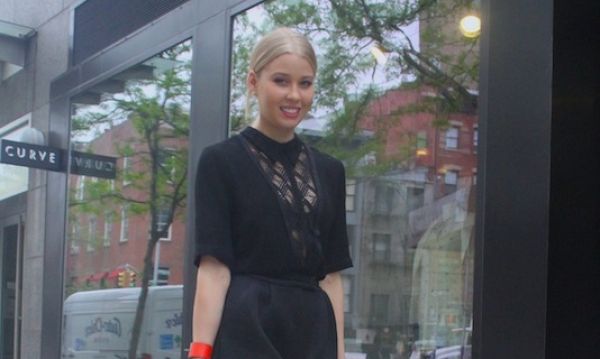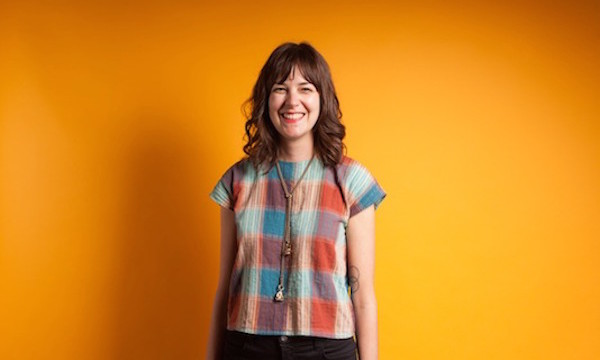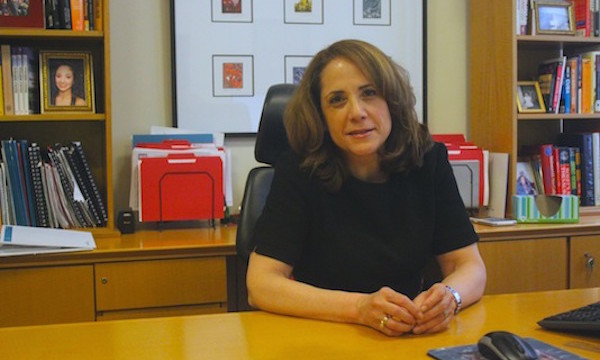
Shop This Look
The Necessary, Occasionally Hilarious Honesty of Katie Porter
An interview with the Congresswoman from California who is known for finding and speaking the truth, especially when it’s her own.
If you know anything about Porter, it should come as no surprise that her group chat—aptly nicknamed the “The No Bullshit Caucus”—was lit up with laughter and ready to give Porter their honest feedback. Porter is famous for getting to the truth, whether she’s grilling the CEO of Wells Fargo with the help of her iconic whiteboard, calling out bills and policies when they aren’t applicable to real Americans, or simply asking friends for fashion advice. And it’s that blazingly transparent, sometimes hilarious honesty, paired with her multitudinous identity—she’s a midwesterner, a private-school kid, a survivor of domestic violence, and a single mother to three school-age children—that has made her such a powerful, trustworthy voice in Congress. “When I ran for Congress, people would ask me how I would balance the job with having three children. It would sometimes be framed as ‘What is going to happen to your children if you win?’ And I didn’t want to hear it, because I had a primary with five men—why was I the only one being asked this? But over time, I realized people really wanted help. They’re asking me how I do it because it’s so hard, and if I have a hot tip, they want it.”
Want more M Dash?
Sign up for our weekly newsletter.
Thank you!
Below, the Congresswoman from California shares her refreshing perspective on power, why childcare isn’t just a women’s issue, and which of her fellow members of Congress have the best—and most confusing—personal style.
Rather than thinking about wielding power, I think about fulfilling unfulfilled needs. That’s my dominant experience in Congress—people need more, and I can’t always deliver it. The American people are struggling. Women are struggling. Children are struggling. People of color are struggling. Lower income people are struggling. Businesses are struggling. And they need help, and they need answers. They want me to do something. But there are all these forces that pile up that make it hard for me to actually deliver. Sometimes there’s this sense of, ‘I didn’t meet people’s needs today.’ I think it is kind of a motherly, womanly way a lot of my female colleagues and I experience the job. Both my male and female colleagues have a sense of what is just and who they should be, but I think for me and my female colleagues, it’s like, ‘somebody wanted pancakes, and all we could manage was Cinnamon Toast Crunch.’


When I got elected, it was sort of this second coming of the ‘Year of the Woman.’ I was like, ‘Oh, I see. So every 25 years, we get one year, right?’ People kept saying to me, ‘Oh, there are so many women in your class. There’s so many women.’ I really took offense to this. ‘So Many Women’ is not what we have going on in Congress—‘So Many Women’ is what shows up to a Vera Bradley outlet sale in the Midwest. We are still underrepresented.
What is encouraging is the diversity of women in Congress. I have colleagues from all different kinds of professions and different backgrounds. They have children. They don’t have children. They’re young. They’re old. Donna Shalala and Abby Finkenauer were the oldest and youngest women to be elected to Congress [in 2018], and they were elected the same year. It’s that diversity of viewpoint and class that’s important, because the American public perceives us as millionaires, and for some that’s true, but it really masks some truths as well. Like, I drive a minivan.
“I think for me and my female colleagues, it’s like, ‘somebody wanted pancakes, and all we could manage was Cinnamon Toast Crunch.’”
It’s expensive to raise children, and childcare takes resources. Part of the feminist movement was that we fought for a right to work. But then what came out of that, I think, was that we didn’t let go of any [domestic] responsibilities. It was like having the right to do extra credit.
One of the things I’ve been really encouraged by in the last couple of months, something I didn’t think I’d see in my lifetime—and certainly not from Joe Biden, not from the oldest male president we’ve ever had—is that he’s not talking about childcare in terms of what women or children need. He talks about it in terms of infrastructure for our economy.


Trading Steven Mnuchen for Janet Yellen was like the deal of the century. She talks about how we don’t make investments in childcare to help women, because they can’t do it all or because they’re stressed out. We make investments in childcare because having women in the workforce is a major driver of economic growth, stability, and global competitiveness.
I’m going to quit saying thank you for addressing childcare, and instead—just as passionately as one of my male colleagues might fight for sensible tax policy or investment in science and tech—I’m going to fight for more support for childcare. We need to provide higher quality, lower cost childcare, because it is to our entire country’s economic benefit. Childcare is not something we do for women. Childcare is something we do for 80-year-old men who never had children. It’s something we do for everybody.
One of the things Elizabeth Warren said to me early on was, when doors close, there’s a tendency to hear that closing, and that sound of that door being slammed shut can cause you to miss the fact that other doors are opening. So you just have to spend most of your time looking for those other open doors and staying in the mindset of being willing to walk through them. Even when I got to Congress, it was a few months of me being like, ‘I’m really junior, I don’t get this. We’re not going to pass the Porter Act any time soon.’ But the important thing is to see that the door was open. Which was like, ‘hey, every bozo gets five minutes in a hearing. I’m going to do something with my five minutes.’
It’s always been interesting to me that we don’t think about being a teacher as a good qualification for Congress. Because really, that’s what it’s about. It’s about learning from your constituents, about learning from your colleagues. It’s about learning from the hearings and then it’s about sharing that information back to the American public, or your constituents, or your colleagues. I make friends easily, and I like people. I think if you are an introvert, I don’t know how you would do this. I mean, there are introverts, but I don’t know how they survive.
We provide less coverage and access to mental healthcare today than we did in the 1960s and 70s. And [mental healthcare] is a really important part of strengthening our workforce. Employers will tell you, and disability insurance companies will tell you, that mental health is a leading cause of missed days of work and unproductively, of workplace stress and tension. So it’s a huge, huge unmet need.

“‘So Many Women’ is not what we have going on in Congress—‘So Many Women’ is what shows up to a Vera Bradley outlet sale in the Midwest.”

I’m a progressive, and I think a lot about what that word means. For me, it means wanting to make progress and recognizing that there are still injustices. Then, it also means believing that the government can be a force for good in addressing some of those problems.
I always pictured work-life balance like the scales of justice. But I’ve learned it’s more like balancing on a bike. You’re just trying not to fall off. You’re going to lean, you’re going to hit bumps, you’re going to have to stop and take a water break. Your bike might break, and you might have to get a new one, but you haven’t lost that skill of being able to balance on the bike. That has really, really helped me, because then I think a lot about the fact that I’m still on the bike. I’m still on the journey. I still have that skill set to be able to be both a parent and a professional. It’s not ever the scales of justice. It’s this very active, continuous kind of balance.
There’s always somebody who has a question and wants an answer. Someone who needs help, who wants me to hear their story. Whether it’s my children or my constituents, it’s somewhat bottomless. The other day, my son was like, ‘Mom, do you think blah, blah, blah, blah is racist?’ And I said, ‘I don’t know, I’d have to think about it.’ He asked me again. I said, ‘I don’t know.’ He asked me again, and I said, ‘Look, I don’t know.’ He finally said, ‘I’m asking as a constituent.’ And I said, ‘Well, call 949-660-XXXX, and we’ll see when someone can get you an answer.’ Like, I’m not available for perpetual constituent questions from my home.
I think it’s going a little far to say I have style at all. But I wear a lot of dresses. I almost never wear pants. I get hot. The dress is typically cooler. It’s one item. I do wear a lot of statement necklaces. I almost always wear a solid color dress and a statement necklace. Most elected officials wear color. Kamala is the exception, not the rule.
I have a whole drawer of scarves, but I hate scarves. They get in my way when I’m trying to get things done. We are supposed to wear certain color scarves on different holidays, so at one point, [Congresswoman] Debbie Dingell got everyone five scarves in five colors, so we could just whip them out. Some of my female congresswomen are like, ‘this is annoying. The congressmen aren’t having to wear [specific] ties.’
I online shop now, and I online shopped before. Because I have children, browsing in a store doesn’t work. Shopping [in person] would require that I get a babysitter and pay for that.
I typically change a couple of times a day. I’ll wear something for a hearing, and then I’ll change at home into flip flops and a skort—love them. Everything is done in flip flops and a skort. I’ll do a lot of jacket on top, skort on the bottom, and then I’ll go for a swim. It’s really easy to get that skort and everything back on over the swimsuit. And now I put more effort into my makeup—especially during the pandemic. My goal is to not have to put on makeup twice in one day.

“Everything is done in flip flops and a skort.”

Veep is a very accurate depiction of Congress. There’s a lot of effort that goes into making this look super glamorous. But the reality is, a lot of the time. I’m sweaty, I’m late, I’m tired, I’m jet-lagged. There’s a lot of running around. I used to wonder why people have staffers. But then I realized that I hadn’t had anything to drink in three hours, I don’t know where my lipstick is, my hair is a mess, and now I’m supposed to go on TV. The one thing I really do miss [during the pandemic] is getting my makeup done for TV, because it’s very relaxing. But once in a while, you end up looking a little strange, so you have to kind of watch them.
There’s some hostility in the House when it comes to personal style. But Susie Lee has excellent taste. Lauren Underwood dresses somewhat similar to me, but she just carries it off better. And I enjoy Rosa DeLauro’s outfits, just because they’re free from convention. I don’t always understand them, but I think they’re kind of fun. When it comes to men, the only person you really notice is Jeff Van Drew. I didn’t know pocket squares were really such a thing.
Photos of Congresswoman Katie Porter by Jenny Hueston
Photo Credits (clockwise):
Rosa DeLauro: Rosa DeLauro/Twitter
Lauren Underwood: Chicago Sun Times via Associated Press
Jeff Van Drew: New York Times via Associated Press
Kamala Harris: Official White House Photo by Lawrence Jackson
Susie Lee: Susie Lee/YouTube







